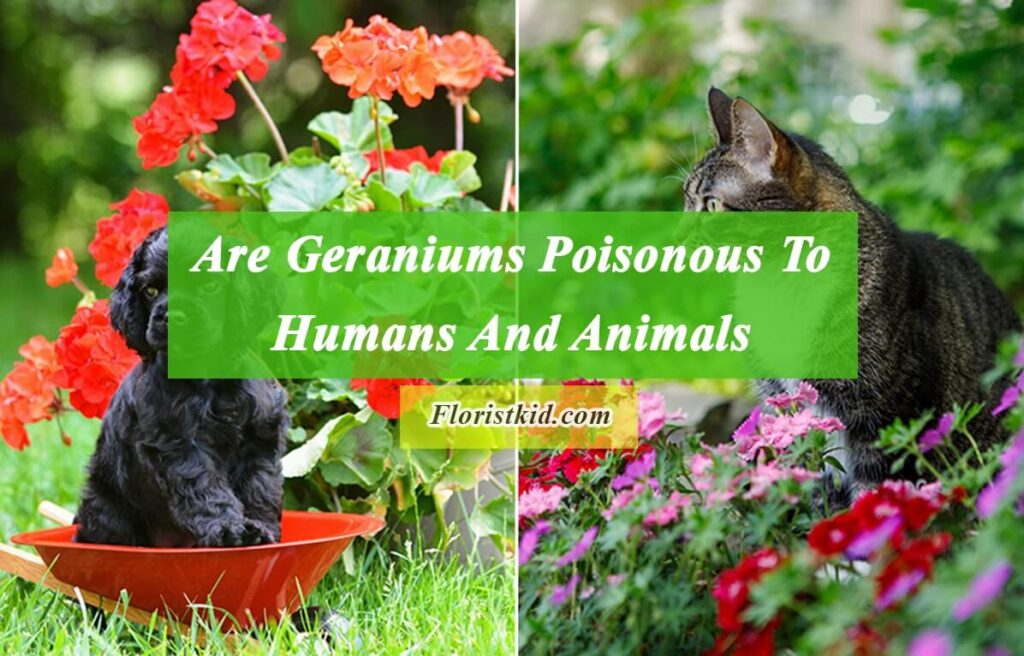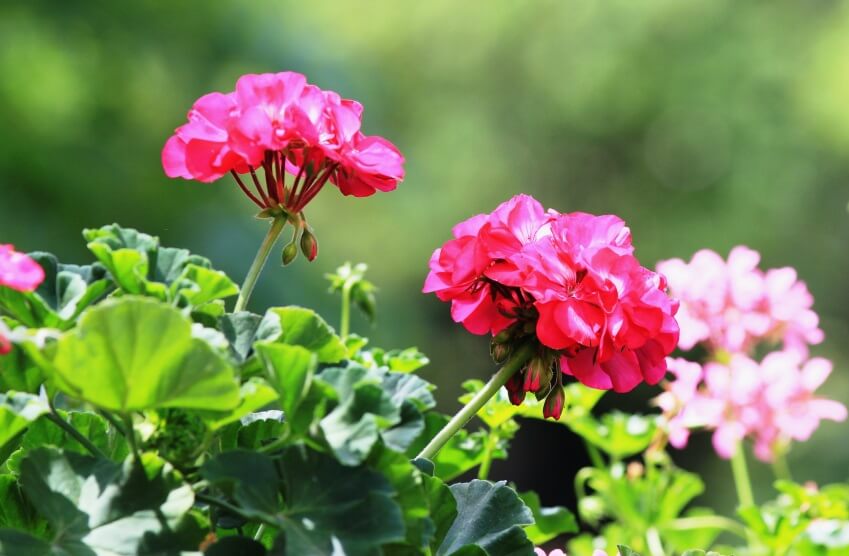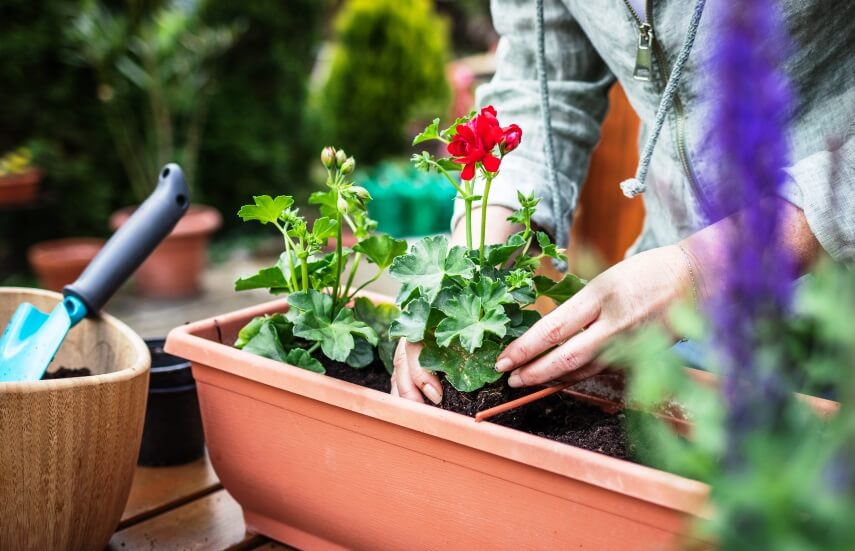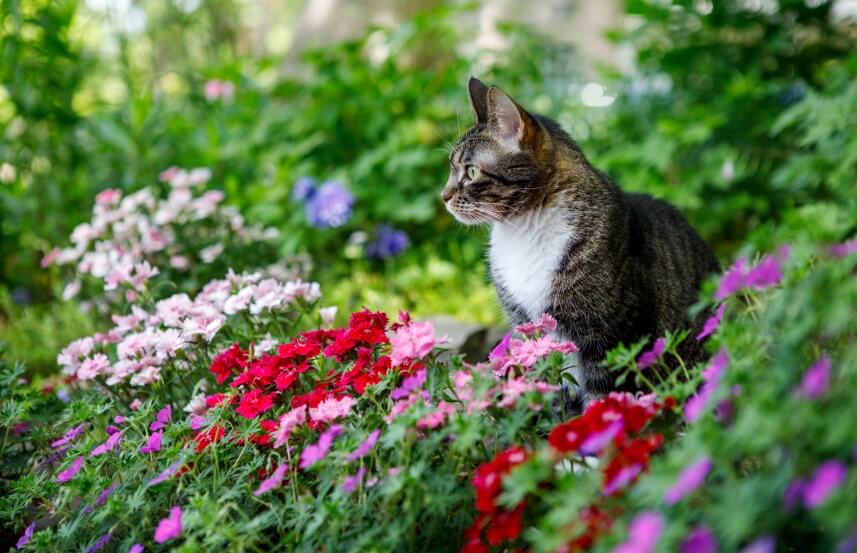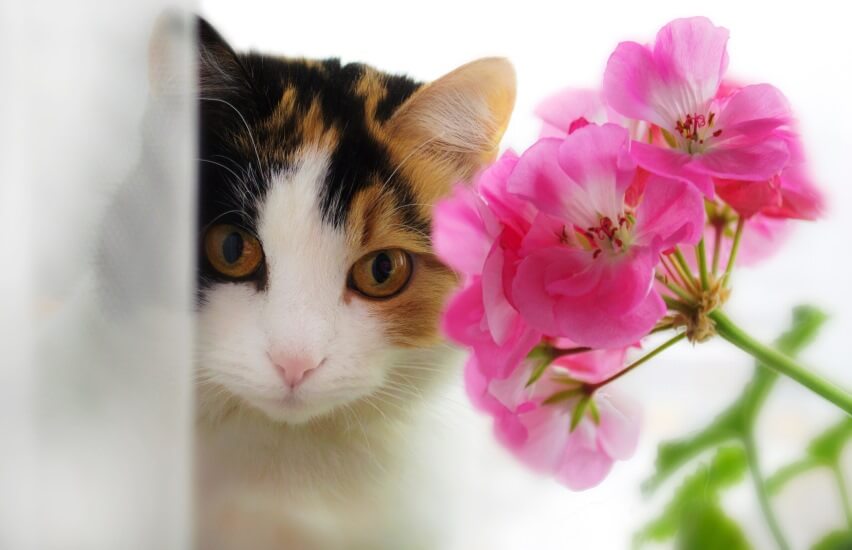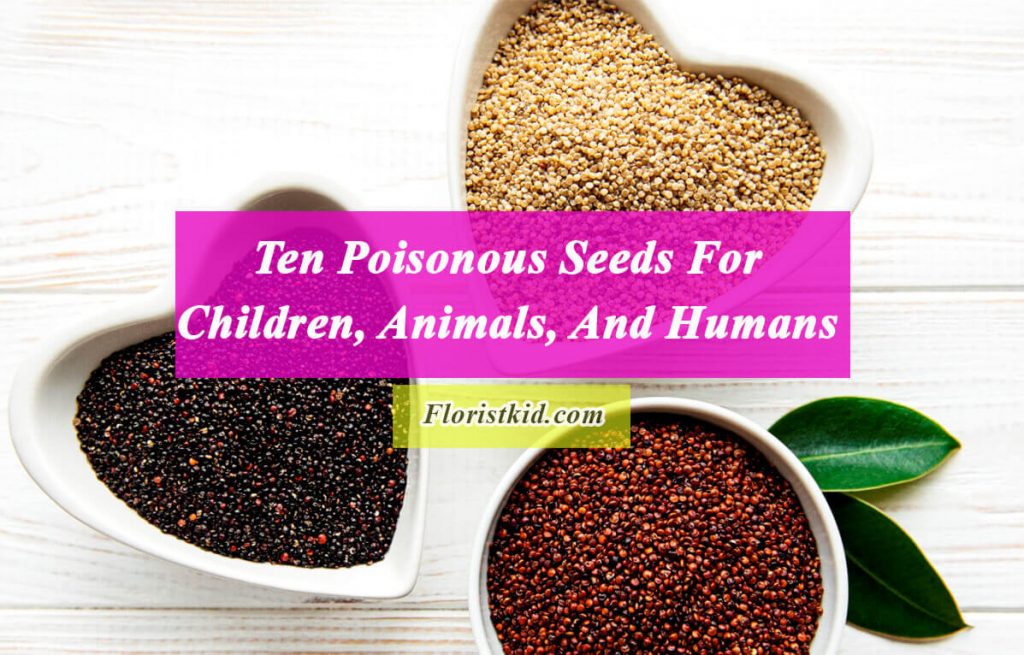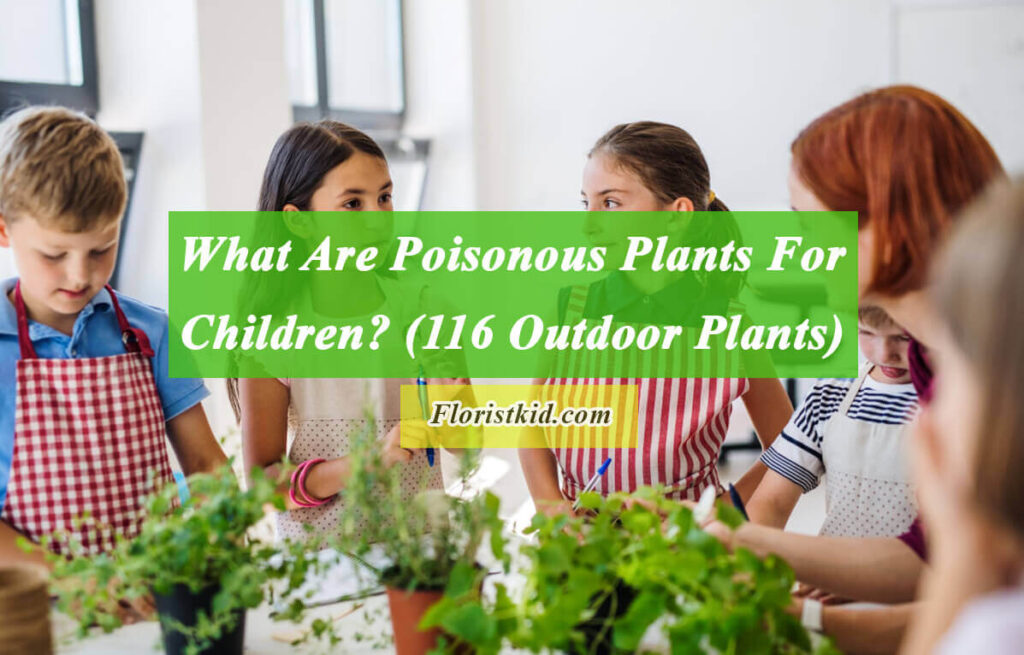Geraniums (Geranium spp.), with their vibrant blooms and delightful fragrance, are a popular choice for gardens and indoor plant enthusiasts worldwide. However, concerns about their toxicity to humans and animals have surfaced. In this article, we will explore the subject to provide a comprehensive understanding of whether geraniums pose any poison-related risks.
If you are interested in this topic, you can also read
<<Is Wisteria Poisonous? >> and <<Are Dahlias Poisonous? >> articles.
Pelargoniums Or True Geraniums
To fully discern the toxicity concerns, it is essential to understand the distinction between Geranium (geraniums) and Pelargonium (common “geraniums”). While both belong to the Geraniaceae family, pelargoniums are known to contain mildly toxic substances that can cause skin irritation or mild stomach upset if ingested. However, severe poisoning cases from pelargoniums are extremely rare.
Geraniums, commonly known as cranesbills, are hardy perennials. True geraniums are mostly outdoor plants and are commonly found in gardens. True geraniums have flowers with five uniformly sized and evenly spaced petals. In contrast, pelargoniums typically display asymmetrically arranged petals, with two at the top and three at the bottom.
Pelargoniums, on the other hand, are often referred to as “geraniums” and are typically tender perennials, often grown as annuals in cooler climates. Pelargoniums are popular as bedding and container plants, with a wide variety of flower colors and patterns. They are also known for their scented leaves, which can range from citrusy to spicy.
Toxic Components Of Geraniums
It is essential to be aware that some varieties of geraniums contain toxic components that may pose risks to human health if improperly handled. Toxic components found in geraniums and practical tips for safe gardening are provided here. These toxic compounds primarily include geraniol and linalool, which are natural plant chemicals (terpenoids) responsible for the characteristic scent of geraniums.
Geraniol and Geranyl Formate
Geraniol, a naturally occurring alcohol, and its ester form, geranyl formate, are commonly found in geraniums. While these compounds are not highly toxic, they can cause mild skin irritation and allergic reactions in sensitive individuals. It is crucial to avoid direct contact with the sap or foliage to prevent any adverse effects [1].
Linalool
Linalool is a naturally occurring compound found in various plants, including geraniums. While it is not highly toxic on its own, when heated or oxidized, it can release potentially harmful substances. Therefore, avoid burning or prolonged exposure to high temperatures of geranium plants [2].
Are Geraniums Poisonous To Humans?
No, geraniums are not poisonous to humans. True geraniums (Geranium spp.) are nontoxic to humans. Their leaves and flowers are not known to cause adverse reactions when ingested or come into contact with the skin. But, pelargoniums are known to contain mildly toxic substances that can cause skin irritation or mild stomach upset if ingested. However, severe poisoning cases from pelargoniums are extremely rare. People often enjoy geranium tea or incorporate geranium leaves into culinary dishes for their distinct flavors [3].
Potential Risks To Humans
Although the toxicity level is low, it is always wise to exercise caution when handling any plant material. Some individuals may exhibit mild allergic reactions when in direct contact with geranium leaves or flowers, resulting in skin irritation or redness. If you have known plant allergies or sensitive skin, it is advisable to wear gloves when handling geraniums [4].
Furthermore, if you plan to consume geranium leaves or prepare geranium-based medicines, it is crucial to ensure they are obtained from reliable and reputable sources. Additionally, consult with a healthcare professional before incorporating geranium-based remedies into your diet or wellness routine.
As with any plant or potential allergen, individuals with known allergies or heightened sensitivity should exercise caution. When handled responsibly and sourced correctly, geraniums can be enjoyed for their aesthetic appeal and even utilized in culinary and therapeutic applications without compromising human health.
Precautionary Measures To Humans
Geraniums are non-toxic to humans, unlike pelargoniums, which contain mild toxins. Unfortunately, distinguishing between the two is not straightforward for most people.As a result, some precautionary measures are mentioned here to work with geraniums [5]:
Wear Protective Gear: When working with geraniums, especially those known to contain toxic components, it is advisable to wear gloves, long sleeves, and eye protection. This will prevent direct contact with the sap or irritant compounds and reduce the risk of skin allergies.
Proper Plant Placement: If you have young children or pets at home, consider placing geraniums out of their reach or opting for non-toxic varieties. This ensures their safety and gives you peace of mind while enjoying your garden.
Good Hygiene Practices: After handling geraniums, always wash your hands thoroughly with soap and water. This will protect you from potential irritants and prevent accidental ingestion if you touch your mouth or face.
Educate Yourself: Familiarize yourself with different geranium varieties and their potential risks. This knowledge will facilitate informed decision-making during plant selection and gardening practices.
Are Geraniums Poisonous To Cats?
Yes, geraniums (pelargoniums) are poisonous to cats. Cats are known for their curious nature and tendency to nibble on plants. As responsible pet owners, it is crucial to ensure that the environment we provide them is safe and free from any potential hazards. Here, we will explore whether geraniums pose any risk to our feline friends and provide guidance to keep them protected [6].
Potential Risks And Precautions To Cats
Geraniums can cause mild to moderate gastrointestinal issues if ingested by cats. Common symptoms to watch out for include vomiting, diarrhea, loss of appetite, abdominal pain, excessive salivation, and lethargy. Severe cases, although rare, could potentially lead to kidney or liver damage, especially if a large quantity of the plant is consumed or if the cat already has an underlying health condition.
Preventing Accidental Ingestion: To keep your feline companion safe from potential harm, it is crucial to take proactive measures to prevent accidental ingestion of geraniums. Consider the following steps:
Placement: Keep geraniums and other potentially toxic plants in a protected area that is inaccessible to cats. Hanging baskets or elevated shelves can be effective deterrents.
Alternative Plants: Opt for pet-safe alternatives if you wish to have greenery indoors. Consult with a local pet store or veterinarian for recommendations on cat-friendly plant choices.
Awareness: Educate yourself about the various types of geraniums and their toxicity levels. This knowledge will help you make informed decisions when selecting plants for your home or garden.
Supervision: Monitor your cat’s behavior while they are near plants, especially if they display a particular interest in nibbling or playing with them. Redirect their attention to suitable toys or treats to discourage plant exploration.
Training: Train your cat using positive reinforcement techniques to avoid chewing on plants. Consistency and persistence are key factors in successful training.
Seeking Veterinary Help: If you suspect your cat has ingested geraniums or is displaying any concerning symptoms, contact your veterinarian immediately. They will provide appropriate guidance based on the severity of the situation and your cat’s individual health needs.
Are Geraniums Poisonous To Dogs?
Yes, geraniums (pelargoniums) are poisonous to dogs. As dog owners, we need to be aware of potential dangers lurking in our homes and yards, including certain plants that could be harmful to our furry friends. How geraniums are poisonous to dogs and what precautions you should take to ensure the safety of your beloved pet are discussed here [7].
Potential Risks And Precautions To Dogs
It is important to exercise caution to prevent any potential issues. Here are a few things to keep in mind:
Ingestion: While the ingestion of small amounts of geranium leaves or flowers is unlikely to cause serious harm, it can still trigger mild gastrointestinal upset in dogs. Symptoms may include drooling, vomiting, diarrhea, or decreased appetite. If you suspect that your dog has ingested geraniums and they display any concerning symptoms, consult your veterinarian for guidance.
Allergies: Just like humans, dogs can develop allergies to various plants, including geraniums. If you notice your dog exhibiting signs of an allergic reaction such as itching, redness, or skin irritation after coming into contact with geraniums, consider removing them from the vicinity of your pet or consulting with a veterinarian to address any potential concerns.
Other Varieties: It is worth noting that there are various species of plants with the common name “geranium.” Some wild geranium species, may have different toxicity levels. It is advisable to double-check the specific type of geranium you have and consult reliable sources or professionals if you are unsure about its safety for dogs.
Safety Guidelines: To ensure the well-being of your dog around geraniums, consider the following safety guidelines:
Supervision: Keep an eye on your dog when outdoors to prevent any accidental ingestion of geranium leaves, flowers, or other plant parts.
Training And Boundaries: If your dog tends to chew or dig, consider training them to avoid the garden or flower beds where geraniums are present. Erecting physical barriers or utilizing pet-safe deterrents can also help reinforce boundaries.
Consult A Veterinarian: If you have any concerns about the safety of specific plants, including geraniums, or if your dog shows unusual symptoms after exposure, do not hesitate to reach out to your veterinarian for professional advice.
Conclusion
While geraniums are generally considered safe for most individuals, it is important to exercise caution, especially for those with sensitivities and pet owners. By understanding the potential risks associated with geraniums and implementing preventive measures, you can enjoy the beauty of these plants without compromising the well-being of yourself or your furry friends. If there are specific concerns or if adverse reactions occur, consult with healthcare professionals for appropriate guidance.
Note: It is essential to understand that this article is for informational purposes only and should not be considered professional medical or veterinary advice. If you have specific concerns or require expert guidance, please consult with a medical professional or veterinarian.

